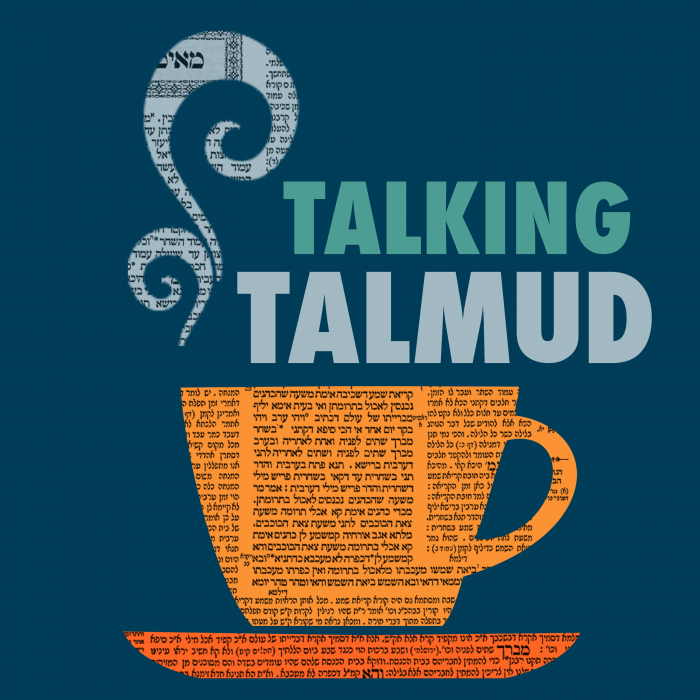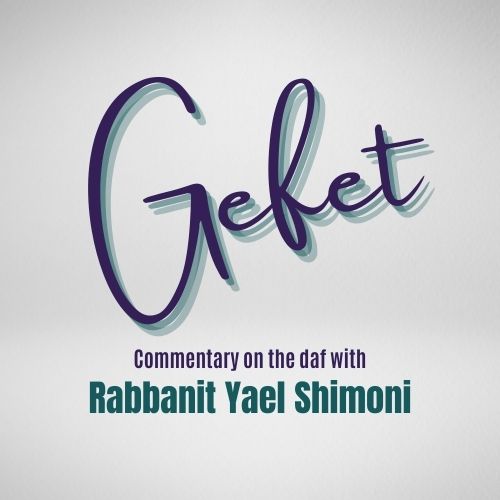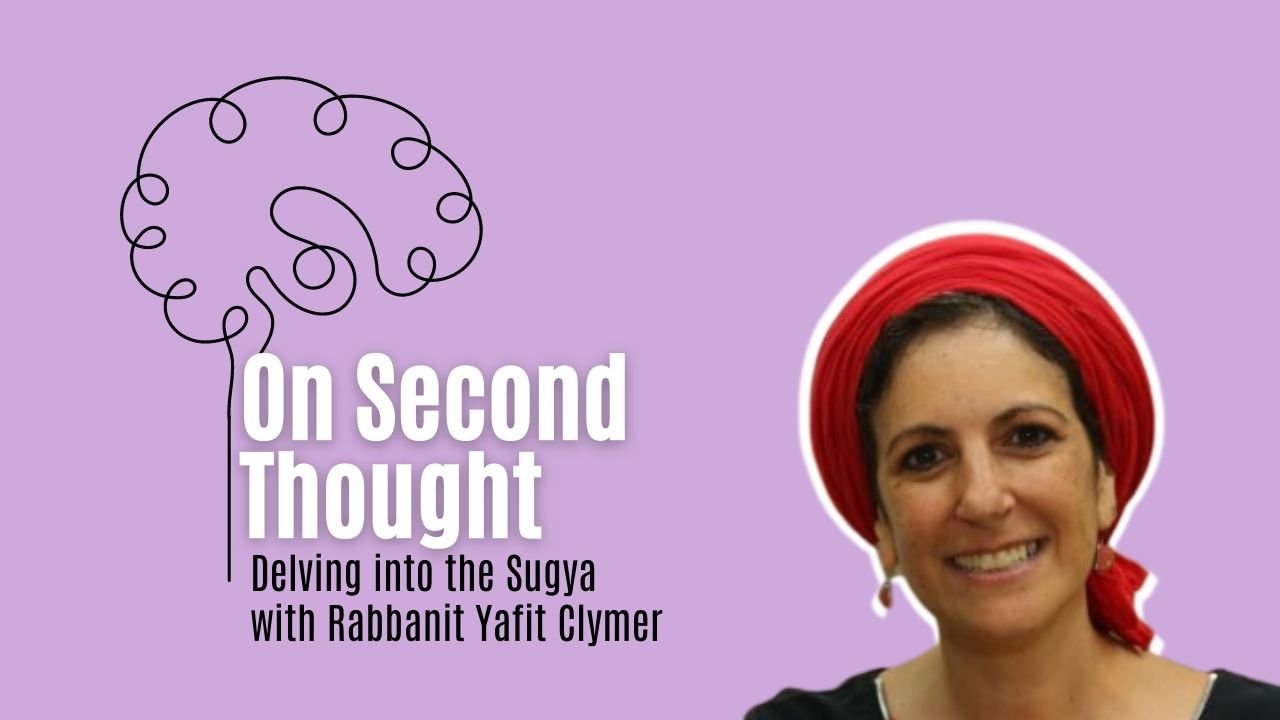Nazir 32
וְאֶת אַחַד עָשָׂר.
and the eleventh. It is a Torah edict that the consecration takes effect with regard to those two animals. Therefore, one cannot infer from this case that an erroneous act of consecration takes effect.
גְּמָ׳ מַנִּי מַתְנִיתִין? לָא רַבִּי יוֹסֵי וְלָא רַבָּנַן.
GEMARA: The Gemara asks: Whose opinion is expressed in the mishna, when it rules that one whose request to dissolve his vow was rejected by a halakhic authority counts the duration of his naziriteship from the moment he took the vow, including the days on which he did not observe the halakhot of naziriteship in practice? The Gemara responds: It is neither the opinion of Rabbi Yosei, nor that of the Rabbis.
דְּתַנְיָא: מִי שֶׁנָּדַר וְעָבַר עַל נְזִירוּתוֹ — אֵין נִזְקָקִין לוֹ, אֶלָּא אִם כֵּן מוֹנֶה בָּהֶן אִיסּוּר כַּיָּמִים שֶׁנָּהַג בָּהֶם הֶיתֵּר. רַבִּי יוֹסֵי אוֹמֵר: דַּיּוֹ שְׁלֹשִׁים יוֹם.
As it is taught in a baraita (Tosefta Nedarim 1:6): With regard to one who took a vow of naziriteship and later transgressed his vow of naziriteship by drinking wine, the halakhic authorities do not attend to his request to dissolve his vow, nor do they let him complete his term as a nazirite by sacrificing offerings, unless he counted, i.e., observed, days of the prohibitions of naziriteship for the same number of days in which he behaved with permissiveness concerning the restrictions of a nazirite. Only after he observes the prohibitions of naziriteship for the number of days that his observance lapsed will a halakhic authority hear his request for dissolution, or allow him to bring his offerings. Rabbi Yosei says: Thirty days is enough for him. He is required to observe additional days of naziriteship only if he transgressed his vow of naziriteship for thirty days or more.
אִי רַבָּנַן, קַשְׁיָא נְזִירוּת מוּעֶטֶת. אִי רַבִּי יוֹסֵי, קַשְׁיָא נְזִירוּת מְרוּבָּה!
The Gemara elaborates: Which of these opinions might correspond to that of the mishna? If it is that of the Rabbis, it is difficult with respect to a short naziriteship, i.e., a standard term of naziriteship, which lasts for thirty days. The Rabbis maintain that he cannot include all the days from the time he took the vow even if his naziriteship was short. They hold that he must add days corresponding to the days that he failed to observe the halakhot required of a nazirite. If it is that of Rabbi Yosei, although he agrees that one who transgresses his vow of naziriteship for a short period of less than thirty days need not add to his term, it is nevertheless difficult with regard to a lengthy naziriteship, as even Rabbi Yosei rules that in such a case the individual must observe naziriteship for additional days.
אִיבָּעֵית תֵּימָא רַבִּי יוֹסֵי, וְאִיבָּעֵית תֵּימָא רַבָּנַן. אִיבָּעֵית תֵּימָא רַבִּי יוֹסֵי: כָּאן בִּנְזִירוּת מְרוּבָּה, כָּאן בִּנְזִירוּת מוּעֶטֶת.
The Gemara answers: If you wish, you can say that the mishna is in accordance with the opinion of Rabbi Yosei, and if you wish, you can say it is in accordance with the opinion of the Rabbis. The Gemara explains: If you wish, you can say that the mishna is in accordance with Rabbi Yosei: Here, the baraita is speaking of a lengthy naziriteship; there, the mishna is referring to a short naziriteship. In other words, the mishna refers only to one who transgresses his vow of naziriteship for less than thirty days.
וְאִיבָּעֵית תֵּימָא רַבָּנַן: לָא תֵּימָא מִשָּׁעָה שֶׁנָּזַר, אֶלָּא אֵימָא כְּמִשָּׁעָה שֶׁנָּזַר.
And if you wish, you can say that the mishna follows the opinion of the Rabbis, by emending its wording: Do not say that he must observe naziriteship from the time that he vowed; rather, say: Like from the time that he vowed. That is, he must count his naziriteship corresponding to the time that has elapsed since he took his vow, exactly as stated by the Rabbis.
נִשְׁאַל לַחֲכָמִים וְהִתִּירוּהוּ וְכוּ׳. אָמַר רַבִּי יִרְמְיָה: מִדְּבֵית שַׁמַּאי נִשְׁמַע לִדְבֵית הִלֵּל. לָאו אָמְרִי בֵּית שַׁמַּאי הֶקְדֵּשׁ בְּטָעוּת הָוֵי הֶקְדֵּשׁ, כֵּיוָן דְּאִיגַּלַּאי מִילְּתָא דְּלָאו שַׁפִּיר נָזַר — תֵּצֵא וְתִרְעֶה בָּעֵדֶר.
§ The mishna taught that with regard to one who requested of the halakhic authorities and they dissolved the vow for him, and he had already separated an animal for a nazirite offering, it shall go out and graze among the flock. Rabbi Yirmeya said: From the ruling of Beit Shammai one can learn a halakha with regard to the opinion of Beit Hillel. Is it not the case that Beit Shammai say that an erroneous act of consecration is considered consecration, and yet once the matter is revealed that his vow of naziriteship was not right, i.e., it has been dissolved, the animal is considered non-sacred and shall go out and graze among the flock.
לְבֵית הִלֵּל נָמֵי, אַף עַל גַּב דְּאָמְרִי תְּמוּרָה בְּטָעוּת הָוְיָא תְּמוּרָה — הָנֵי מִילֵּי הֵיכָא דְּאִיתֵיהּ לְעִיקַּר הֶקְדֵּשׁ. אֲבָל הֵיכָא דְּמִיתְעֲקַר עִיקַּר הֶקְדֵּשׁ — אִיתְעֲקַר נָמֵי תְּמוּרָה.
Rabbi Yirmeya continues: According to the opinion of Beit Hillel as well, even though they say that a substitution of a consecrated animal for another performed in error is a valid substitute, this applies only when the initial consecration, i.e., the consecration of the first animal, is in effect, in which case a substitution can take place. However, in a situation where the initial consecration has been uprooted, i.e., a halakhic authority dissolved the vow pertaining to the first consecration, the first animal is no longer consecrated, and therefore the substitute is also uprooted, i.e., the animal remains non-sacred.
אָמַר מָר: אִי אַתֶּם מוֹדִים שֶׁאִילּוּ קָרָא לַתְּשִׁיעִי עֲשִׂירִי כּוּ׳. אִיתְּמַר: מַעֲשֵׂר, רַב נַחְמָן אָמַר: טָעוּתוֹ, וְלֹא כַּוּוֹנָתוֹ. רַב חִסְדָּא וְרַבָּה בַּר רַב הוּנָא אָמְרִי: טָעוּתוֹ, וְכׇל שֶׁכֵּן כַּוּוֹנָתוֹ.
§ The Master said in the mishna: Don’t you concede with regard to one who called the ninth animal: Tenth, that it is consecrated? It was stated that amora’im engaged in a dispute concerning this point. With regard to the animal tithe, Rav Naḥman said: It is consecrated in the above manner only if it resulted from his error, but not from his intentional declaration. If the owner was aware that it was the ninth animal and called it: Tenth, on purpose, his consecration is ineffective. Rav Ḥisda and Rabba bar Rav Huna say: His error consecrates the animal, and all the more so his intentional declaration, i.e., if he called the ninth or eleventh animals: Tenth, in full knowledge that they were not the tenth.
אֲמַר לֵיהּ רָבָא לְרַב נַחְמָן: לְדִידָךְ דְּאָמְרַתְּ טָעוּתוֹ וְלֹא כַּוּוֹנָתוֹ, דְּקָאָמְרִי בֵּית שַׁמַּאי לְבֵית הִלֵּל: אִי אַתֶּם מוֹדִים שֶׁאִילּוּ קָרָא לַתְּשִׁיעִי עֲשִׂירִי, וְלָעֲשִׂירִי תְּשִׁיעִי, וְלָאַחַד עָשָׂר עֲשִׂירִי, שֶׁשְּׁלָשְׁתָּן מְקוּדָּשִׁין? וְאִישְׁתִּיקוּ בֵּית הִלֵּל.
Rava said to Rav Naḥman: According to your opinion, that you say it is only his error that consecrates the ninth animal and not his intentional declaration, consider that Beit Shammai said the following to Beit Hillel in the mishna as proof that erroneous consecration is valid: Don’t you concede that if he called the ninth: Tenth; the tenth: Ninth; and the eleventh: Tenth, that all three are consecrated? And Beit Hillel were silent in face of this question.
לֵימְרוּ לְהוֹן: מָה לְמַעֲשֵׂר שֶׁכֵּן אֵינוֹ קָדוֹשׁ בְּכַוּוֹנָה.
However, according to your opinion, let Beit Hillel say to Beit Shammai: While it is correct that an erroneous act of consecration takes effect with regard to animal tithe, one cannot learn the halakha of other types of consecration from there, as what is unique about tithe is that it is not consecrated if his declaration concerning the wrong animal was intentional, whereas other types of consecration are typically the result of a purposeful act. Since other types of consecration take effect with intent, an erroneous act of consecration is not considered consecration.
אָמַר רַב שִׁימִי בַּר אָשֵׁי: הַיְינוּ טַעְמָא דְּלָא אָמְרִי לְהוֹן, דְּקַל וָחוֹמֶר הוּא: מָה מַעֲשֵׂר שֶׁאֵינוֹ קָדוֹשׁ בְּכַוּוֹנָה — קָדוֹשׁ בְּטָעוּת, הֶקְדֵּשׁ, שֶׁקָּדוֹשׁ בְּכַוּוֹנָה — לֹא כׇּל שֶׁכֵּן?!
Rav Shimi bar Ashi said: This is the reason that Beit Hillel did not say that answer to Beit Shammai, as one can argue in the opposite manner, by saying that it is an a fortiori inference: If tithe, which is not consecrated when he acts intentionally, is nevertheless consecrated if he acted erroneously; with regard to other types of consecration, which are consecrated intentionally, is it not all the more so that an act of erroneous consecration should render an item consecrated?
וְלָא הִיא, דְּהֶקְדֵּשׁ בְּדַעְתָּא דְמָרֵיהּ תְּלֵי.
The Gemara rejects this argument: And this is not so, as this a fortiori inference is flawed, as consecration depends on the intention of the owner, and therefore it cannot apply when done in error. By contrast, the animal tithe is not consecrated through the intention of its owner but merely by counting, as every tenth animal is consecrated.
מַתְנִי׳ מִי שֶׁנָּדַר בְּנָזִיר, וְהָלַךְ לְהָבִיא אֶת בְּהֶמְתּוֹ, וּמְצָאָהּ שֶׁנִּגְנְבָה. אִם עַד שֶׁלֹּא נִגְנְבָה בְּהֶמְתּוֹ נָזַר — הֲרֵי זֶה נָזִיר.
MISHNA: With regard to one who took a vow of naziriteship and went to bring his animal which he set aside for his nazirite offering and discovered that it was stolen, and due to the need to separate an additional animal now regrets having taken his vow, if he took a vow of naziriteship before his animal was stolen, he is a nazirite, as a vow cannot be dissolved as the result of a later event.
וְאִם מִשֶּׁנִּגְנְבָה בְּהֶמְתּוֹ נָזַר — אֵינוֹ נָזִיר. וְזוֹ טָעוּת טָעָה נַחוּם הַמָּדִי: כְּשֶׁעָלוּ נְזִירִים מִן הַגּוֹלָה וּמָצְאוּ בֵּית הַמִּקְדָּשׁ חָרֵב, אָמַר לָהֶם נַחוּם הַמָּדִי: אִילּוּ הֱיִיתֶם יוֹדְעִין שֶׁבֵּית הַמִּקְדָּשׁ חָרֵב, הֱיִיתֶם נוֹזְרִים? אָמְרוּ לוֹ: לֹא. וְהִתִּירָן נַחוּם הַמָּדִי.
But if he took a vow of naziriteship after his animal was stolen, he is not a nazirite, as it is retroactively established that his vow was taken in error from the outset, as he relied on an animal he did not possess. And this was the error that Naḥum the Mede erred when he failed to distinguish between an event that occurred before the vow was taken and an event that occurred afterward. The incident in question was as follows: When nazirites were ascending from the exile to sacrifice their offerings, and they found the Temple destroyed, Naḥum the Mede said to them: If you had known that the Temple would be destroyed, would you have taken a vow of naziriteship? They said to him: Certainly not, as there is no remedy for a naziriteship in this case. And Naḥum the Mede dissolved the vow for them.
וּכְשֶׁבָּא הַדָּבָר אֵצֶל חֲכָמִים אָמְרוּ: כׇּל שֶׁנָּזַר עַד שֶׁלֹּא חָרַב בֵּית הַמִּקְדָּשׁ — נָזִיר. וּמִשֶּׁחָרַב בֵּית הַמִּקְדָּשׁ — אֵינוֹ נָזִיר.
And when the matter came before the Rabbis, they said: His ruling is incorrect. Rather, whoever took a vow of naziriteship before the Temple was destroyed, like these nazirites from the exile, he is a nazirite, as he committed no error at the time of his vow, and one cannot dissolve vows based a new situation. However, one who stated his vow after the Temple was destroyed is not a nazirite, as he vowed based on an erroneous assumption.
גְּמָ׳ אָמַר רַבָּה: שַׁטְפוּהוּ רַבָּנַן לְרַבִּי אֱלִיעֶזֶר וְאוֹקְמֻיהּ בְּשִׁיטְתַיְיהוּ. דִּתְנַן: פּוֹתְחִין בְּנוֹלָד, דִּבְרֵי רַבִּי אֱלִיעֶזֶר, וַחֲכָמִים אוֹסְרִין.
GEMARA: In relation to the mishna’s statement with regard to the dissolution of a vow of naziriteship due to a new situation, the Gemara cites a statement that Rabba said: The Rabbis overwhelmed Rabbi Eliezer until he retracted his ruling and established the halakha in accordance with their opinion. To what does this refer? As we learned in a mishna in Nedarim (64a): They may broach dissolution by asking about a new situation, i.e., a halakhic authority can dissolve a vow due to a new situation that the one who took the vow did not anticipate at the time he took his vow. This is the statement of Rabbi Eliezer; but the Rabbis prohibit this. Since Rabbi Eliezer does not disagree in the case of naziriteship in this mishna, he must have accepted the opinion of the Rabbis.
וְאָמַר רָבָא: אַף עַל גַּב דַּאֲמוּר רַבָּנַן אֵין פּוֹתְחִין בְּנוֹלָד, אֲבָל פּוֹתְחִין בִּתְנַאי נוֹלָד. הֵיכִי דָּמֵי? אָמְרִי לְהוֹן: אִילּוּ אֲתָא אִינִישׁ וַאֲמַר לְכוֹן דְּחָרַב בֵּית הַמִּקְדָּשׁ, מִי הֲוָה נָדְרִיתוּן?
And Rava said, with regard to the same issue: Even though the Rabbis said that they may not broach dissolution by asking about a new situation, however, they may broach dissolution by asking about the conditions of a new situation, i.e., with situations similar to a new situation. What are the circumstances of this type of broaching dissolution? The halakhic authorities say to the nazirites who took their vows before the destruction of the Temple: If a person had come and said to you before you took your vow that the Temple will be destroyed, would you have vowed? Although the destruction of the Temple itself is a new situation, its potential occurrence existed when they vowed, and therefore if they answered that they would not have vowed had they known this, their vows are dissolved.
אָמַר רַב יוֹסֵף: אִי הֲוַאי הָתָם, הֲוָה אָמֵינָא לְהוֹן: הָכְתִיב ״הֵיכַל ה׳ הֵיכַל ה׳ הֵיכַל ה׳ הֵמָּה״ — זֶה מִקְדָּשׁ רִאשׁוֹן וּמִקְדָּשׁ שֵׁנִי.
Rav Yosef said: If I had been there, when those nazirites arrived, I would have said the following to them, in order to dissolve their vows: Isn’t it written: “The Sanctuary of the Lord, the Sanctuary of the Lord, the Sanctuary of the Lord, are these” (Jeremiah 7:4). This thrice repetition of “Sanctuary of the Lord” is referring to the First Temple and the Second Temple which are destined to be destroyed, leading to a Third Temple. These nazirites should have considered the possibility of the Temple’s destruction, and this can serve as a means of broaching the dissolution of their vows.
נְהִי דְּיָדְעִין לְהוֹן דְּיִחְרוּב, מִי יוֹדְעִין לְאִימַּתִּי?! אָמַר אַבָּיֵי: וְלָא יָדְעִין לְאִימַּת? וְהָכְתִיב: ״שָׁבוּעִים שִׁבְעִים נֶחְתַּךְ עַל עַמְּךָ וְעַל עִיר קׇדְשֶׁךָ״! וְאַכַּתִּי מִי יָדְעִינַן בְּהֵי יוֹמָא?!
The Gemara responds: Although they might have known that the Second Temple would be destroyed, as the verse speaks of three Temples, did they know when it would be destroyed? Would they have considered that it might occur in their lifetimes, preventing them from sacrificing their offerings? Abaye said: And did they not know when? But isn’t it written: “Seventy sevens are decreed upon your people and upon your sacred city” (Daniel 9:24), which indicates that the Second Temple would be destroyed seventy Sabbatical cycles of seven years after the destruction of the First Temple, which is 490 years. The Gemara answers: And still, did we know on which day it would be destroyed? It was therefore impossible to use this factor as a means to broach the dissolution of their vows.
מַתְנִי׳ הָיוּ מְהַלְּכִין בַּדֶּרֶךְ, וְאֶחָד בָּא כְּנֶגְדָּן, אָמַר אֶחָד מֵהֶן: ״הֲרֵינִי נָזִיר שֶׁזֶּה פְּלוֹנִי״, וְאֶחָד אָמַר: ״הֲרֵינִי נָזִיר שֶׁאֵין זֶה פְּלוֹנִי״, ״הֲרֵינִי נָזִיר שֶׁאֶחָד מִכֶּם נָזִיר״, ״שֶׁאֵין אֶחָד מִכֶּם נָזִיר״, ״שֶׁשְּׁנֵיכֶם נְזִירִים״, ״שֶׁכּוּלְּכֶם נְזִירִים״.
MISHNA: If there were people walking along the way, and one other person was approaching them, and one of those walking said: I am hereby a nazirite if this person approaching us is so-and-so. And another one of them said: I am hereby a nazirite if this is not so-and-so, while a third member of the group said: I am hereby a nazirite if one of you two is a nazirite, and a fourth said: I am hereby a nazirite if neither of you is a nazirite, and another added: I am hereby a nazirite if both of you are nazirites. Finally, the last person said: I am hereby a nazirite if all you who spoke before me are nazirites.
בֵּית שַׁמַּאי אוֹמְרִים: כּוּלָּן נְזִירִין. וּבֵית הִלֵּל אוֹמְרִים: אֵינוֹ נָזִיר אֶלָּא מִי שֶׁלֹּא נִתְקַיְּימוּ דְּבָרָיו. וְרַבִּי טַרְפוֹן אוֹמֵר: אֵין אֶחָד מֵהֶם נָזִיר.
Beit Shammai say that they are all nazirites, as by saying: I am hereby a nazirite, they have accepted naziriteship upon themselves even if their statements turn out to be incorrect. Beit Shammai maintain that a vow of naziriteship taken in error is considered a valid vow of naziriteship. And Beit Hillel say: Only he whose statement was not fulfilled is a nazirite. And Rabbi Tarfon says: Not a single one of them is a nazirite, including those whose statements were correct. Rabbi Tarfon maintains that a vow of naziriteship must be pronounced in an explicit manner, without any hint of uncertainty. In this case, none of them knew for sure the identity of the person coming toward them, and therefore they could not be certain they were nazirites at the time of their vows.
הִרְתִּיעַ לַאֲחוֹרָיו — אֵינוֹ נָזִיר. רַבִּי שִׁמְעוֹן אוֹמֵר: יֹאמַר ״אִם הָיָה כִדְבָרַי — הֲרֵינִי נְזִיר חוֹבָה, וְאִם לָאו — הֲרֵינִי נְזִיר נְדָבָה״.
If the person approaching them turned back so that his identity was never discovered, not one of them is a nazirite. The matter was never clarified, and the halakha is lenient in cases of uncertain naziriteship. Rabbi Shimon says that the halakha is stringent with regard to an uncertainty of this kind, and therefore they should proceed as follows in order to avoid any uncertainty: Each of those who took a vow should say: If it was in accordance with my statement, I am hereby an obligatory nazirite, as my condition was fulfilled, and if not, I am hereby a voluntary nazirite, and in this manner they are all nazirites either way.
גְּמָ׳ מִי שֶׁלֹּא נִתְקַיְּימוּ דְּבָרָיו, אַמַּאי הָוֵי נָזִיר? אָמַר רַב יְהוּדָה, אֵימָא: מִי שֶׁנִּתְקַיְּימוּ דְּבָרָיו.
GEMARA: The Gemara questions the opinion of Beit Hillel: Why is he whose statement was not fulfilled a nazirite? Rav Yehuda said: One must emend the wording of the mishna so that it says: Only he whose statement was fulfilled becomes a nazirite.

























